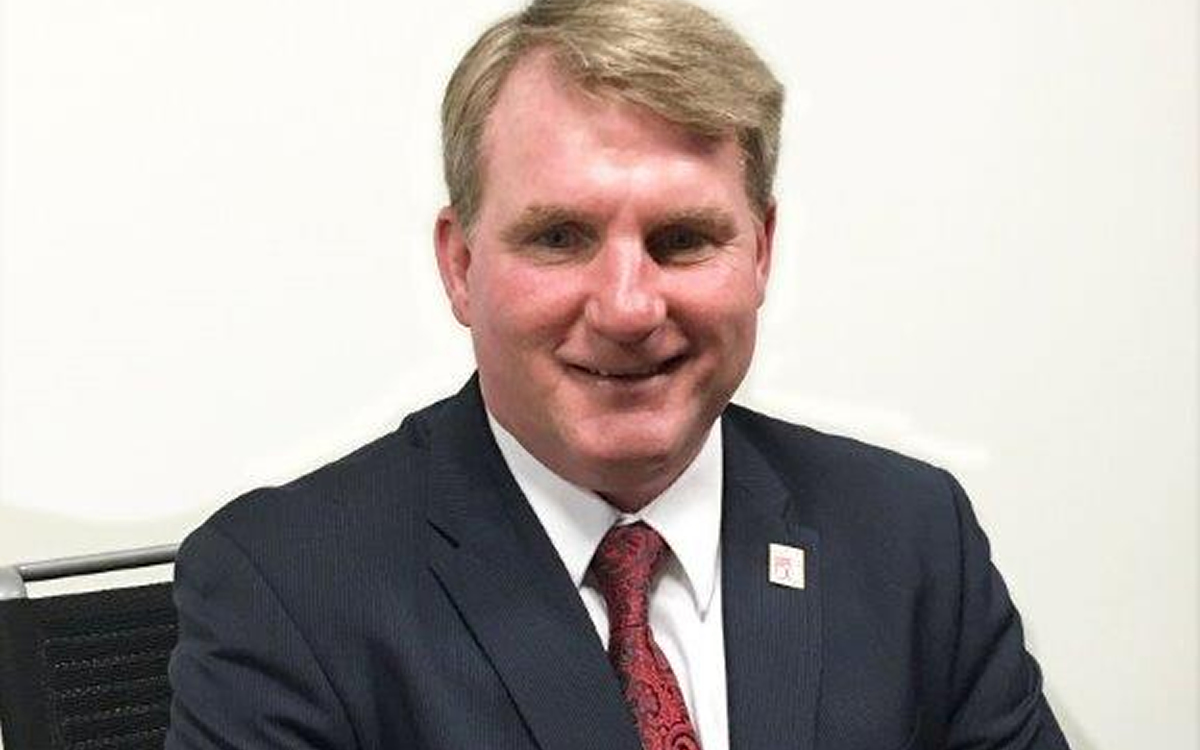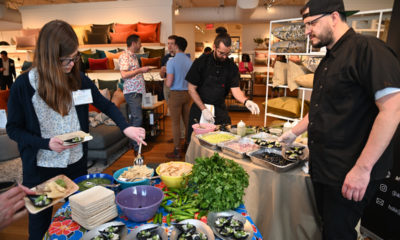District of Columbia
Large crowds expected at Capital Pride parade, festival
Bowser says there are no credible threats to events

Hundreds of thousands of people are expected to attend the Capital Pride Parade on Saturday.
The parade will follow a 1.5-mile route that will step off on 14th Street at T Street, N.W., and finish on P Street at 21st Street, N.W. A map of the expected parade route can be found on the Capital Pride website.
The Capital Block Party will take place at the intersection of Q and 17th Streets, N.W., during the parade. The party will feature local vendors, food trucks and a 21+ beverage garden and it will also have a designated viewing area for families with children to watch the parade, along with other children’s activities.
The fourth annual Pride on the Pier will take place at the Wharf during the parade. The event, hosted by the Washington Blade, LURe DC and the Wharf, will have a fireworks show, a DJ and more.
The parade will be followed by the Capital Pride Festival on June 11. Taking place on Pennsylvania Avenue, N.W., the festival will feature more than 300 booths with local vendors, businesses and organizations. From 12-8 p.m., the Capital Pride Concert will host acts such as Broadway actress Idina Menzel and “RuPaul’s Drag Race” winner Monét X Change.
D.C. Mayor Muriel Bowser last Thursday told the Washington Blade after she helped to raise the Progress Pride flag at the Wilson Building that there have been no credible threats to any upcoming Pride events in D.C. amid a rise in violence against the LGBTQ community.
“MPD is constantly working with all of our agencies to make sure we have safe special events and we’re going to keep going with our planning, like we do every year,” Bowser said. “There’s always a scan for any threats to the District.”
The Metropolitan Police Department is investigating a bomb threat made on Twitter for the annual District Pride concert scheduled for June 29 at the Lincoln Theatre.
Temperatures are forecast to reach the mid-80s on Saturday and the low-90s on Sunday. Precipitation chances on both days are low.
With recent air quality issues, Alert DC is advising those with respiratory issues to wear masks, avoid strenuous activities and reduce time spent outdoors.
Further details and a full calendar of events can be found on the Capital Pride website.
District of Columbia
Taste of Point returns at critical time for queer students
BIPOC scholar to speak at Room & Board event on May 2

The Point Foundation will kick off May with its annual Taste of Point DC event. The event will be hosted at Room & Board on 14th Street and feature a silent auction, food tastings, a speech from a scholar, and more.
Point’s chief of staff, Kevin Wright, said that at Taste of Point, the scholars are the star of the show.
“People never come to an event to hear Point staff speak, they come to hear from the people most impacted by the program,” he said. “At its core Taste of Point is designed to center and highlight our scholars’ voices and experiences.”
This year, a Point BIPOC Scholar, Katherine Guerrero Rivera will speak at the event.
“It is a great opportunity to highlight the scholars out there on the front lines making impacts in almost every sector and job field,” Wright said.
Wright pointed out that this year especially is a pivotal time for LGBTQ students.
“In 2023, there were 20 states that passed anti-LGBTQ legislation,” he said. “By this point in [2024] we already have more.”
Wright said the impacts of those legislative attacks are far reaching and that Point is continuously monitoring the impact they have on students on the ground.
Last month, The Washington Post reported that states with anti-LGBTQ laws in place saw school hate crimes quadruple. This report came a month after a non-binary student, Nex Bennedict, died after being attacked at school.
“So, we see this as a critical moment to really step up and help students who are facing these challenges on their campus,” Wright said. “Our mission is to continue to empower our scholars to achieve their full academic and leadership potential.”
This year Point awarded nearly 600 LGBTQ students with scholarships. These include the flagship scholarship, community college scholarship and the BIPOC scholarship. When the foundation started in 2002, there were only eight scholarships awarded.
Dr. Harjant Gill is one of those scholars who said the scholarship was pivotal for him. Gill said he spent his undergraduate years creating films and doing activism for the LGBTQ community.
As a result, his academic record wasn’t stellar and although he was admitted into American University’s graduate program he had no clue how he would fund it.
Upon arrival to American he was told to apply for a Point scholarship and the rest was history.
“It ended up being the one thing that kept me going otherwise I would have dropped out,” he said. “Point was incredibly instrumental in my journey to becoming an academic and a professor.”
More than a decade later, Gill serves on the host committee for Taste of Point and is a mentor to young Point scholars. He said that he donates money yearly to Point and that when he is asked what he wants for a gift he will often tell his friends to donate too.
To attend the event on Wednesday, May 2, purchase tickets at the Point website. If you can’t attend this year’s Taste of Point DC event but would like to get involved, you can also donate online.
District of Columbia
Three of five LGBTQ candidates win race for DNC delegate from D.C.
32 candidates competed for 13 elected seats in party caucus

Three out of five known LGBTQ candidates running for election as delegates from D.C. to the Democratic National Convention won their races at an April 20 Democratic Party caucus election held at D.C.’s Walter Washington Convention Center.
Ward 2 gay Democratic activist John Fanning finished in first place with 140 votes and Ward 8 gay Democratic activist David Meadows finished in second place with 127 votes in a race in which six male candidates committed to supporting President Biden were competing for three male seats in a section of the city designated as Congressional District 1, which included registered Democratic voters in Wards 1, 2, 6, and 8.
Ward 7 gay Democratic activist Jimmie Williams won his race, finishing in third place with 200 votes in a race in which eight male candidates committed to President Biden competed for four male seats in the Congressional District 2 section of the city that included Wards 3, 4, 5, and 7.
Gay Democratic activist Felipe Afanador lost his race, finishing in sixth place with 47 votes in the Congressional District 2 election for male candidates backing Biden. It couldn’t immediately be determined which of the four wards in District 2 he is from.
The Washington Blade didn’t learn about Afanador’s status as an LGBTQ candidate until the Capital Stonewall Democrats announced it one day before the April 20 party election in an email statement.
In the Congressional District 2 race among female candidates, in which eight candidates competed for three female seats, transgender rights advocate and Ward 3 Democratic Party activist Monika Nemeth lost her race, finishing in sixth place with 49 votes.
The five LGBTQ candidates were among 32 candidates competing for just 13 elected delegate positions in D.C. D.C. will have a total of 51 delegates to the Democratic Convention, but the other 38 include elected officials and party leaders who are considered “automatic” or appointed delegates. The Democratic Convention will be held in Chicago Aug. 19-23.
Observers familiar with the April 20 party caucus election said Fanning, Meadows, and Williams had participated in local D.C. Democratic Party events and activities for a longer period than Nemeth and Afanador and appear to have been better known among Democratic voters in their respective wards as well as other wards. Those factors contributed to their receiving significantly more votes than most other candidates, observers have said.
In his candidacy statement posted on the D.C. Democratic Party website, Afanador said he worked on the 2020 Biden presidential election campaign in Pennsylvania. His LinkedIn page says in 2022 he began work in Washington for the Biden administration as an official in the U.S. Department of Agriculture.
Nemeth is a past president of D.C.’s Capital Stonewall Democrats, the city’s largest LGBTQ local political group, and has been an active member of the D.C. Democratic State Committee, the local party governing body. She served as a Biden delegate at the 2020 Democratic National Convention.
“It is important for our D.C. delegation to have strong LGBTQ representation,” Capital Stonewall Democrats said in its April 19 statement. “There are five LGBQ candidates running to be delegate, and Capital Stonewall Democrats asks that our members support each one,” the statement says.
“Unfortunately, they fell short, but they and all queer Democrats are welcome to attend and participate in convention events and activities sponsored by the national and local party,” Meadows told the Blade in referring to Nemeth and Afanador. “Our shared goal is to unite behind the Biden-Harris ticket to protect our LGBTQ rights from being dismantled by Donald Trump and the GOP,” Meadows said.
“Running for District Delegate is one of the most grassroots efforts,” Fanning told the Blade. “It’s very beneficial to align yourself on a slate with community leaders that have either previously run for District Delegate or have developed a constituency in their community from other civic engagements,” he said, referring to possible reasons for his, Meadows, and Williams’s election victory.
Aside from the D.C. elected LGBTQ delegates, two prominent D.C. LGBTQ Democratic leaders will be appointed as delegates to the 2024 Democratic National Convention in their role as members of the Democratic National Committee from D.C. They are Claire Lucas, a highly acclaimed Democratic Party and LGBTQ rights advocate and party fundraiser; and Earl Fowlkes, one of the lead organizers of D.C.’s annual Black LGBTQ Pride celebration and former president of the Capital Stonewall Democrats. Both are committed to supporting President Biden as the Democratic nominee for re-election.
District of Columbia
New D.C. LGBTQ+ bar Crush set to open April 19
An ‘all-inclusive entertainment haven,’ with dance floor, roof deck

D.C.’s newest LGBTQ+ bar called Crush is scheduled to open for business at 4 p.m. on Friday, April 19, in a spacious, two-story building with a dance floor and roof deck at 2007 14th St., N.W. in one of the city’s bustling nightlife areas.
A statement released by co-owners Stephen Rutgers and Mark Rutstein earlier this year says the new bar will provide an atmosphere that blends “nostalgia with contemporary nightlife” in a building that was home to a popular music store and radio supply shop.
Rutgers said the opening comes one day after Crush received final approval of its liquor license that was transferred from the Owl Room, a bar that operated in the same building before closing Dec. 31 of last year. The official opening also comes three days after Crush hosted a pre-opening reception for family, friends, and community members on Tuesday, April 16.
Among those attending, Rutgers said, were officials with several prominent local LGBTQ organizations, including officials with the DC Center for the LGBTQ Community, which is located across the street from Crush in the city’s Reeves Center municipal building. Also attending were Japer Bowles, director of the Mayor’s Office of LGBTQ Affairs, and Salah Czapary, director of the Mayor’s Office of Nightlife and Culture.
Rutgers said Crush plans to hold a grand opening event in a few weeks after he, Rutstein and the bar’s employees become settled into their newly opened operations.
“Step into a venue where inclusivity isn’t just a promise but a vibrant reality,” a statement posted on the Crush website says. “Imagine an all-inclusive entertainment haven where diversity isn’t just celebrated, it’s embraced as the very heartbeat of our venue,” the statement says. “Welcome to a place where love knows no bounds, and the only color or preference that matters is the vibrant tapestry of humanity itself. Welcome to Crush.”
The website says Crush will be open Tuesdays and Wednesdays from 4 p.m. to 12 a.m., Thursdays from 4 p.m. to 2 a.m., Fridays from 4 p.m. to 3 a.m., Saturdays from 2 p.m. to 3 a.m., and Sundays from 2 p.m. to 12 a.m. It will be closed on Mondays.
Crush is located less than two blocks from the U Street Metro station.
-

 South America4 days ago
South America4 days agoDaniel Zamudio murderer’s parole request denied
-

 Maryland4 days ago
Maryland4 days agoMontgomery County police chief discusses arrest of trans student charged with planned school shooting
-

 Commentary5 days ago
Commentary5 days agoWorld ‘isn’t much different today’
-

 Theater4 days ago
Theater4 days ago‘Amm(i)gone’ explores family, queerness, and faith











